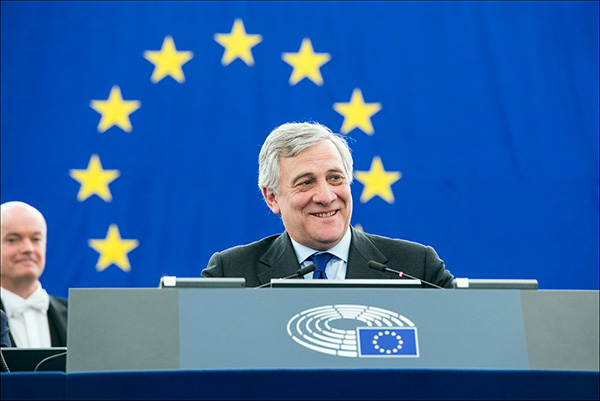
Something has come apart in the European Parliament, and this may end up being a healthy development, although it gives rise to some cause for concern as well. Half-way through a five-year legislative term, a Social-Democratic President usually follows a Christian-Democrat predecessor. Or vice versa. This has been the well-established tradition of the chamber. To all appearances it will be respected again. Hard on the heels of the German Social-Democrat Martin Schulz, the new occupant is the Italian conservative Antonio Tajani. However, that is merely the appearance since in actual fact it is not the outcome of the now-traditional agreement, but rather of a fierce struggle for MEPs’ votes. The consensus on which the institution rests has been shattered, along with a good deal of the European construct, the lovechild, as Jacques Delors would say, of the chaste amours between Christian-Democracy and Social-Democracy, to which, in the case of the European Parliament and others, should be added the liberals.
This time it appeared that the pact would enable Schulz to remain for the full five-year term, but he then left his post to become German Foreign Minister, and, perhaps, Social-Democratic candidate for the office of Chancellor in the crucial (for Europe) elections of 24 September. The Social-Democrats wanted to retain possession of the post with Gianni Pitella and forced a vote without securing a consensus beforehand. After four nail-biting counts the candidate who emerged with a majority was Tajani, a former European Commissioner and collaborator of Silvio Berlusconi, from the EPP (European People’s Party) group, the largest in the Parliament, with 217 seats out of 751, although it has been in decline for over a decade (like the socialists and democrats).
The European Parliament, although to a good many EU citizens it seems remote from their daily lives, has been steadily acquiring considerable power with successive changes in the EU treaties. The 2014 elections heralded a new procedure for choosing the President of the European Commission: the Spitzenkandidaten, heading groups or lists, who were the candidates of each political bloc for the post. Ultimately the victor was a Christian-Democrat from Luxembourg, Jean-Claude Juncker. Schulz failed to win the contest although he did secure the Presidency of the European Parliament.
The idea of the Spitzenkandidaten was to encourage the electorate to vote, but turnouts continue on their downward trend in European elections. Rather than mobilising voters, the new system led to polarisation between pro- and anti-Europeans, and fostered the growth and influence of the latter. And the image of the European Parliament has not improved. According to the latest Eurobarometer, released in autumn 2016, in the 28-member EU an average of 42% of respondents tend to trust the European Parliament while 45% mistrust it. Member countries’ national parliaments fare even worse, however: only 32% of respondents trust their own parliaments, as opposed to 62% who mistrust them. Spain conforms to the pattern, although in a more extreme way: 33% of Spaniards trust the European Parliament (17% trust the Spanish one), and 57% mistrust it (77% trust the Spanish one).
Apart from killing off the traditional system of agreed alternation, Tajani’s election entails two further novelties. In order to win, as well as relying on the liberals from the outset, he ultimately had to secure the support of the Conservative and Reformist group, which covers a number of parties that are in fact from the centre-, extreme and Eurosceptic right, starting with the British Tories and the Polish PiS (Law and Justice Party). And this comes in the run-up to the Brexit negotiations when voices critical of the EU are in the ascendant. However, the Parliament has appointed as its Brexit coordinator the Belgian liberal and European federalist, Guy Verhofstadt, Spitzenkandidat for his group in 2014, and who at the last moment withdrew his bid to become President of the Parliament in a pact with the EPP. Nor should it be forgotten that Verhofstadt was behind the bungled attempt to incorporate into the liberal group the MEPs of Beppe Grillo’s Italian Five Star party, which wants a referendum on the euro. However, the Five Star Movement is one that has much about it that is liberal, anti-state and also anti-European. One question is whether Tajani now finds himself in some way indebted to these Eurosceptics (there are others, both to the extreme right and to the extreme left), although he has promised to be a ‘President for all’.
The other change we may see in the European Parliament is the advent of ‘adversarial politics’, involving greater left-right confrontation, at least between the conservatives –who are far from attaining an absolute majority– and a Social-Democrat grouping in decline and more disposed to forging alliances with the left, including a left-wing grand coalition; such an oddity would be hard to cobble together, among other reasons because of the internal dynamics of each country. In any event, ideological confrontations now regularly arise in the Parliament’s 22 standing committees.
Tajani’s election means that all the EU’s main institutions (the Commission, the Council and the Parliament) are led by members –all men– of the European People’s Party, the Italian socialist Federica Mogherini being the only woman well-placed for continuity as the High Representative for Foreign Affairs and Security. And this comes when, despite everything, the EU is governed by consensuses and coalitions, normally ‘grand’ coalitions, which will continue being necessary in the face of the uncertain future that awaits the European project. The latter requires new rules and procedures, as does the European Parliament too.


